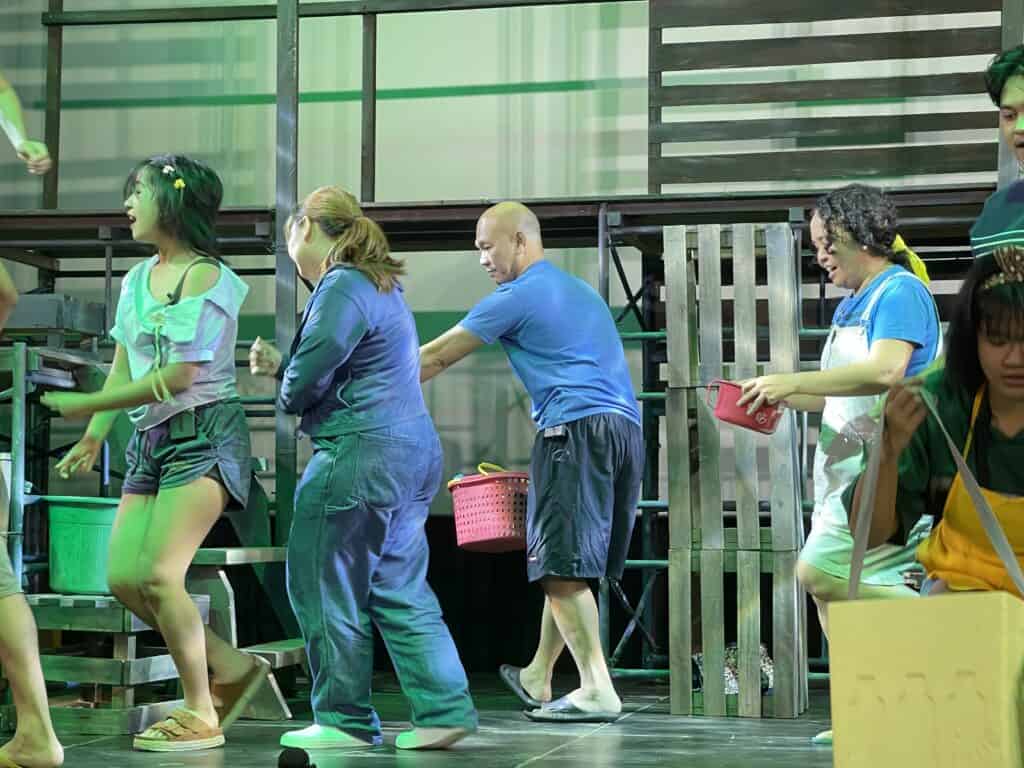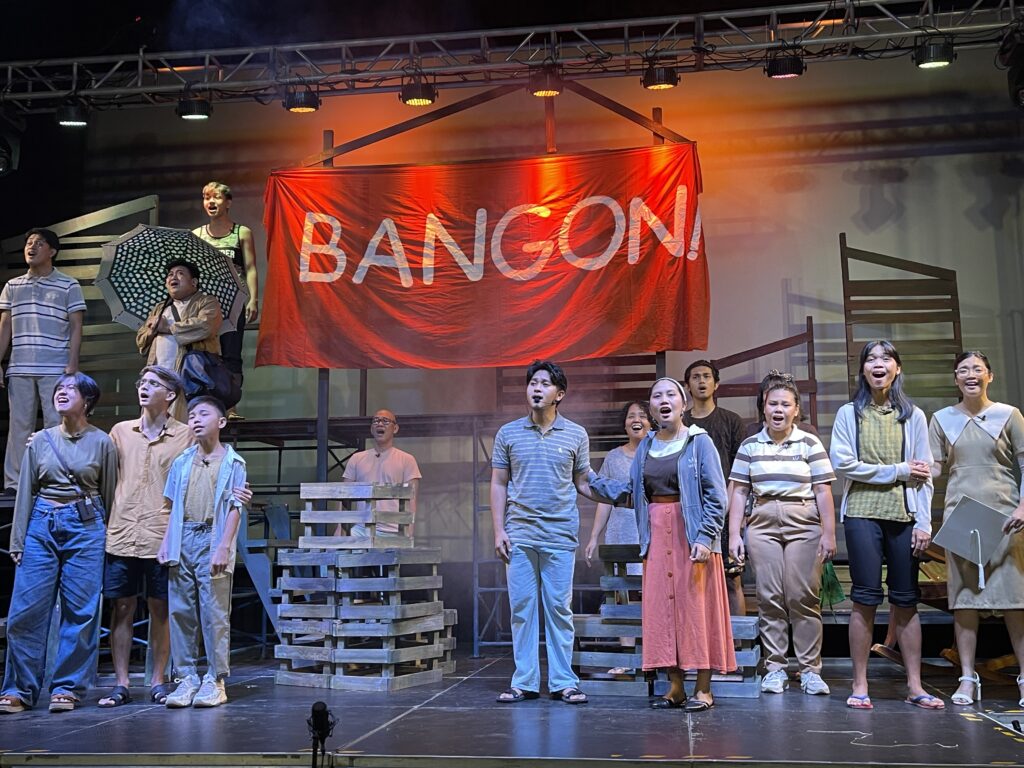It has been nearly a week since the staging of the highly anticipated musicale in town rolled down its curtains to the public, the 90-minute show ‘Higit sa Pag-ibig: The Musical’ continues to leave its audience yearning for more of Barangay Eskwala and its people’s quest to reason, freedom, justice, and love.
First staged as a theater play in August 2021, written and directed by Sari Saysay, Higit sa Pag-ibig is no longer new to the public’s eyes. However, this year’s restaging and reenactment did not just give way to the talents and artistry of Albayanos in the theater, but also catapulted the great potential of the theater scene in the province.
With ten full house shows that was able to cater at least 1,900 audiences on October 4-8, 2023 at the Cinema 4 of Ayala Malls Legazpi City, it is evident that this show did not just give us a worthy performance, but also left a clear message on what is true to Albay theater.
From its euphonious and ear-catching songs, to its strong premise that made us repeatedly ask the same question until the end of the show, to the bubbly and firecracker personality of Candy that perfectly tickles our laughter, down to the most disturbing and tearjerker backstories of Jojo, John, and other characters that made us weep and hang on to our seats.
Sining Banwa and Dawani Project’s efforts successfully marked a significant trajectory to another flourishing, yet already existing culture of theater and Albayano’s love and mastery of the art.
Albay theater is alive and we can’t wait to see more of it unfold in the next months and years to come.
And while we wait for what’s next to this milestone, let’s take a quick rundown on the adventures in Barangay Eskwala and discuss some of the most important points made in the show.
What is love in Brgy. Eskwala?
Set in a fictional community of Barangay Eskwala that’s facing a demolition threat and whip of catastrophe from the deteriorating climate crisis, each characters playfully and purposely go along with the show’s main premise: “Ano ang higit sa Pag-ibig?”
Lines such as, “Marunong kang mag-mahal, pero marunong ka bang mahalin?”and “Konsepto lang ang bahay, ngunit konkreto ang pag-uwi,” were just few of the many lines thrown that still make an impact even after the show’s curtain call.
Becoming the musical that it was, the songs and words of dwta, Rahuyo, Al Jang, The Late Bloomers, and Vaan Castelo gave more life and meaning to an already well applauded show with the original titles such as “Pumalakpak”, “Parisukat”, “Marami pa akong gustong sabihin”, “Mag-aalab”, “Silbi”, “Napakaraming demonyo”, and many more.
But what truly made the show more remarkable however, aside from the notable performances of the actors, was the clever pronunciation of the concept of love in the grasp of socio-political-climate issues that somehow played the role of an invisible antagonist all throughout the musicale.
The alarming issues folded in between the story such as poverty, famine, right to education, issues on reading literacy, rapid urbanization, activism, red-tagging, forced displacement, submerging cities, and suicide gave more depth to the story. Each concerns were carefully discussed ensuring that all characters were able to tell their individual stories while also leaving a question that marked their identities.
John who represents a displaced individual and victim to rapid urbanization, forced displacement and the government’s lack of action to proper housing;
Candy, Kakit, Jei-jei, and Adam who playfully embody and breathe new life into the ailing education system of the country, leading to poor reading literacy and a lack of access to basic education. Meanwhile, Katherine’s character encapsulates the bitter irony of a privileged existence ensnared within an underprivileged community;
Jojo and Tya Beth who endures the hardships of being part of a marginalized group and gets controlled by the government officials and men-in-uniform who fails to see reason between injustice and authority; Aris who becomes a victim of illegal recruiters, that mirrors the government’s inability to support its citizen’s fundamental requirement for secure employment;
The never ending and unconditional love by the character of ‘Papa’ to her daughter, and the brave characters of Tonyang, Ram, Lani, Paula, and Sofia who fought for their rights in Barangay Eskwala.
And when everything seems to be hanging at the edge of a precipice, this musical also showcases the Basa Eskwala Reading Center and CoSeaNa Kitchen that sparks hope in the almost submerged small community of Barangay Eskwala.
Higit sa Pag-ibig may have let us question and think of our own definitions of love, but it also taught us that love in its purest form is not one-definitive. Love is subjective but love in all form is valid.
To love Albay theater
Now that the Eskwala’s story has been told, what is next to their adventure? Or rather, what can theater enthusiasts do in order to keep the theater scene afloat in the province?
The answer is crystal clear: Support local theater and the people that makes ‘the theater’.
Theater is the melting pot of all forms of art, and to support theater means to support all of the people involved in making the show.
It should not just stop from one Facebook share of their promotional materials or long post slash sentiment of how good the show is on our social media accounts.
Continuously spread the word and watch whenever there is a theater show in the locale may it be in Albay or outside the province.
Continuously stream the songs of the people who composed or contributed on the original songs played in the musical and attend theater (art) workshops organized by local artists themselves.
If one of the actors or crew in the production has a small art business, support them by purchasing their art and (again) spread the word to the public.
Keep on demanding for new shows, rerun, and restaging in order to keep the industry alive. But most importantly, pay for what you demand.
Because no matter how talented, great, and expert our artists are in their field, if there’s no enough and strong support system, none of this will pay off. Take it from Sebastian Bautista’s words: In order for arts and artists to thrive, one must pay for their art.
Now let’s give this love back to every Barangay Eskwala and be the reason why artists continue to hone their craft. I Ken Oliver Balde








